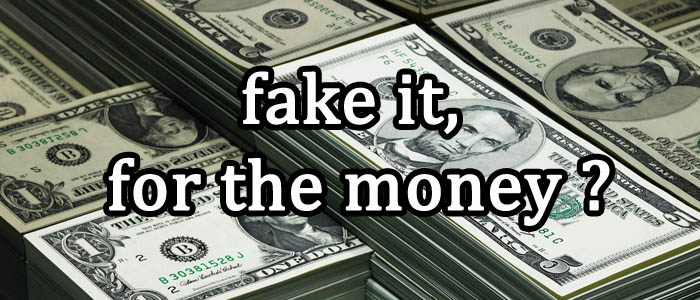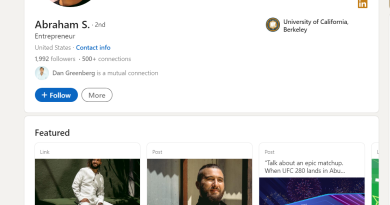Fake it till you make it … The Who When Why !
“Fake it till you make it” (or “Fake it until you make it“) is a business philosophy / strategy often employed in the tech startup ecosystem. The idea suggests that by imitating confidence, competence, and success, a startup can become successful.
The strategy is based on some level of deception and dishonesty. Either being dishonest to the customer, or in the case of startups, to the early investors.
The earliest direct reference to this idea, is in a Simon & Garfunkel song “Fakin’ It”, released in 1968 as a single and also on their BOOKENDS album. There Simon sings “And I know I’m fakin’ it, I’m not really makin’ it.”
Entrepreneurs Fake it, to get Business Contracts
I wrote recently about a quote by Roy Ash. An entrepreneur tends to bite off a little more than he can chew hoping he’ll quickly learn how to chew it. The quote essentially describe how entrepreneurs exaggerate their competence or their company’s capabilities in-order to land deals or contracts … Essentially faking it until they make it! And this is Roy Ash, not some nobody writer getting paid 2 bucks to write about a subject. (see who is Roy Ash).

Marketers Faking it, to get Media Attention
Around 13-14 years ago, i was testing ways to advertise my sites on youtube, even launching a silly viral campaign. I then discovered a way to increase my youtube views artificially. I actively used it to increase the views of my youtube ad videos. This allowed me to regularly, get these ads on top of the then most viewed videos page. This will lead to real users noticing my videos, and me getting visits to my websites.
One day, a guy called Dan Greenberg contacted me, he was interested in knowing how i managed to get several of my videos to the ‘most viewed page’. (it was a thing back then). Dan asked if i would be willing to promote videos he sends me for 50-200$ a video. That led to a fruitful partnership with him and his partner. During this partnership, i inflated the views for many videos they sent. At first i thought they wanted to get the videos to the ‘most viewed videos’ page of youtube to get the real views, then i realized it was all about faking it, to pretend that the “video is viral“, and thus getting coverage and stories from the media and press. (In this article Dan pitching his services).
The partnership ended within a year, after Dan launched a startup focused on media seeding articles and found a way to get the fake view from facebook apps. Dan’s partner, Matt, later turned to art and is known these days as the most famous artist. Matt is doing a great job and is still being loyal to the concept of faking it to get the media attention. (example of his genius ideas).
I work in marketing, i know that getting media attention is free advertising. Businesses telling fake stories to the media did not start with youtube videos. Faking it to the media dates back to the early days of printed press.

Small businesses Fake it, to get Customer Trust
I am sure you know at least one person from your friends or family who have done it. How many businesses you know, asked family and friends or even employees, to leave a positive review on the facebook page or google business page?
I have seen at least half a dozen such businesses faking the trust. This extends to product reviews (especially on amazon), this even goes beyond the small circle or friends and family, as now people simply pay strangers for reviews on various sites.
Why faking reviews? Customers will hesitate to cooperate with a business online, thus reviews are essential. Unless you are providing a great service/product and know how to request a review, chances are that you will have few reviews.
Reviews also play a role locally, as they help people narrow the potential businesses to choose from. Thus businesses realized they need reviews, and most are faking it to get the trust of the customer.
Fake team, is another aspect of faking it, transforming a 1 man company into a 10 people team. Why faking a team? A big team confers trust to the company.
Fake portfolio, yet another aspect of faking it, but this is mostly used by new companies that still haven’t had much clients, or simply by deceitful companies and individuals. Why faking a portfolio? It is basically faking the experience and skills.

Influencers Faking it, to get Better Pay
Influencer marketing is big, and these mostly internet celebrities, get better offers and better deals when they have more followers, and active followers … That is why many influencers buy fake followers and fake likes, to get better offers from potential clients (influencer fraud did cost businesses $1.3 billion in 2019).
Many businesses buy fake followers and fake likes too, just to appear more popular than they actually are, however that backfires as the reach of real people get reduced.

Founders Faking it, to get Investors Money
Small businesses, companies, but mostly startups sometimes fake growth. Growth is very important in investment decisions, that is why often startups fake their growth (users/sales/downloads/installs/etc…). In most cases they succeed in lying to the investor, or at least convincing the investor to invest the money in the company/ startup. In some cases, the startups even faked the technology !

Startups Fake it, to get Exposure and Growth
As i said at the beginning, “Fake it till you make it” (or “Fake it until you make it“) is a strategy often employed in the tech startup ecosystem. I left the dedicated startup part till last, because by faking it startups try to achieve any of the above points …
But maybe what stands up the most in startup ecosystem, something that is almost unique to the startup ecosystem, and maybe it is one of the reasons “Fake it till you make it” philosophy became so popular … it is the fake success stories !
With every new popular startup, you will hear about some exaggerated success stories, that vary from totally fake to highly exaggerated. The success stories might not appear to be directly pushed by the startup, but in fact they are 100% orchestrated and rehearsed by the startup in question.
For example, you:
– Read an interview about how a 10 year old kid made millions with videos on a certain platform.
– Heard about how a unemployed teacher became a millionaire by creating a course on a learning platform.
– Read about how a designer launched a huge design company simply thanks to orders on a small tasks platform.
– Was told about a model earning a million dollar monthly on a fan subscription platform. etc etc …
All these stories have one purpose and one purpose alone, the purpose is to get people join these platforms.
And thus startups will fake it, to get media exposure that lead to user growth.







